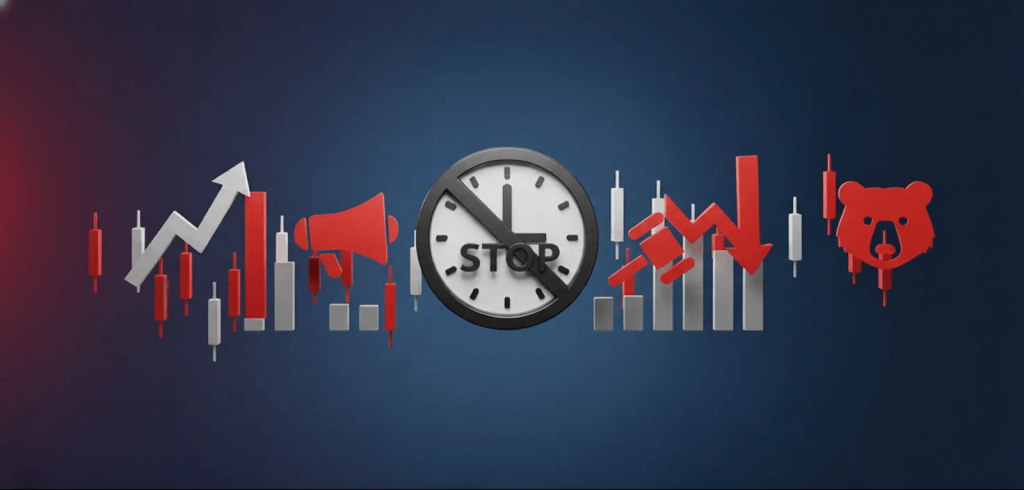
10 Cuốn Sách Giao Dịch Tốt Nhất Để Đọc Năm 2026 (dành cho Người Mới Bắt Đầu và Các Nhà Giao Dịch Nâng Cao)
Mục lục
Để thành công trong các thị trường thay đổi nhanh chóng, các nhà giao dịch phải tiếp tục học hỏi. 10 cuốn sách giao dịch tốt nhất năm 2026 này bao gồm mọi thứ từ phân tích kỹ thuật đến tâm lý giao dịch và quản lý rủi ro. Dù bạn là người mới bắt đầu hay là nhà giao dịch có kinh nghiệm, những tác phẩm kinh điển này có thể sắc bén thêm lợi thế của bạn.
Bảng Tóm Tắt Nhanh
| Tiêu đề | Tác giả | Tâm lý giao dịch | Tốt nhất cho |
| Giao dịch trong vùng | Mark Douglas | Tâm lý giao dịch | Tất cả các cấp độ |
| Nhà giao dịch huyền thoại | Jack Schwager | Phỏng vấn các nhà giao dịch hàng đầu | Cấp độ trung gian đến nâng cao |
| Phân tích kỹ thuật các thị trường tài chính | John Murphy | Phân tích kỹ thuật | Người mới bắt đầu |
| Cổ đông thông minh | Benjamin Graham | Đầu tư giá trị | Từ người mới đến nâng cao |
| Hồi ức của một nhà giao dịch | Edwin Lefèvre | Tư duy giao dịch | Tất cả các cấp độ |
| Một giao dịch tốt | Mike Bellafiore | Giao dịch tập trung vào quy trình | Cấp độ trung gian |
| Bị lừa bởi sự ngẫu nhiên | Nassim Taleb | Rủi ro và xác suất | Nâng cao |
| Nhà giao dịch kỷ luật | Mark Douglas | Kỷ luật cảm xúc | Tất cả các cấp độ |
| Giao dịch xác suất cao | Marcel Link | Thiết kế chiến lược | Cấp độ trung gian |
| Kỹ thuật biểu đồ nến Nhật | Steve Nison | Mô hình nến | Tất cả các cấp độ |
"Giao dịch trong khu vực" - Mark Douglas
Sách cổ điển "Trading in the Zone" của Mark Douglas khám phá kỹ lưỡng những trở ngại tâm lý ngăn cản việc giao dịch hiệu quả. Hoàn hảo cho các nhà giao dịch ở mọi cấp độ đang vật lộn với sự kiểm soát cảm xúc, cuốn sách này đặc biệt hữu ích cho những cá nhân hiểu biết về kỹ thuật giao dịch nhưng nhận thấy rằng các rào cản tâm lý đang ngăn cản kết quả nhất quán. Douglas nhấn mạnh sự cần thiết phải thay đổi quan điểm để trở nên xác suất, nhận ra rằng thị trường tự nhiên là không chắc chắn, và tập trung vào quản lý rủi ro thay vì dự đoán.
Các bài học quan trọng từ cuốn sách này là học cách suy nghĩ theo xác suất để nắm bắt bản chất thực sự của rủi ro, đạt được kỷ luật và sự tự tin cần thiết để thường xuyên thực hiện các chiến lược giao dịch, và củng cố khả năng chịu đựng tinh thần để bám sát các chiến thuật trong bối cảnh biến động của thị trường. Cuốn sách cung cấp các công cụ đặc biệt bao gồm các khung tư duy và các hoạt động hữu ích cho phép các nhà giao dịch hấp thụ những ý tưởng này và thực hiện chúng trong các môi trường giao dịch thực tế. Hiểu các yếu tố tâm lý trong giao dịch như cuốn sách này trình bày có thể giúp các nhà giao dịch tăng cường tính nhất quán và cảm thấy tự chủ hơn trong kết quả kinh doanh của họ.
"Nhà Ảo Thuật Thị Trường" - Jack D. Schwager
Cuốn sách này cung cấp một kho tàng kiến thức về nhiều chiến thuật giao dịch mà người đọc sẽ khám phá qua các cuộc phỏng vấn với một số nhà giao dịch thành công nhất trên nhiều thị trường. Các nhà giao dịch từ trung cấp đến chuyên gia đang tìm kiếm ý tưởng và những hiểu biết hữu ích để cải thiện chiến lược giao dịch của riêng họ sẽ tìm thấy sự phù hợp hoàn hảo trong cuốn sách này. Những ai muốn biết cách mà các nhà giao dịch tinh hoa tạo ra lợi thế đặc biệt của họ và điều chỉnh theo những biến động của thị trường sẽ thấy nó đặc biệt hữu ích.
Người đọc sẽ tìm hiểu về nhiều triết lý giao dịch, chiến lược quản lý rủi ro và nhu cầu về khả năng phục hồi tâm lý. Những bài học quan trọng bao gồm việc hiểu cách các nhà giao dịch thành công nhìn nhận rủi ro, tiếp cận thua lỗ và phục hồi. Những trải nghiệm trực tiếp và câu chuyện cá nhân cung cấp cái nhìn sâu sắc về những gì cần có để thành công trong giao dịch là một trong những đặc điểm nổi bật của cuốn sách này. Học hỏi từ những trải nghiệm của các nhà giao dịch hàng đầu sẽ truyền cảm hứng cho người đọc tạo ra các kế hoạch phù hợp với kỹ năng và nhận thức thị trường của họ.
"Phân Tích Kỹ Thuật Các Thị Trường Tài Chính" - John J. Murphy
Kiệt tác này được coi là nền tảng cho mọi người thực hiện phân tích kỹ thuật. Những người mới bắt đầu mong muốn xây dựng một nền tảng vững chắc trong phân tích kỹ thuật cũng như những nhà giao dịch trung cấp đang tìm cách nâng cao kiến thức của họ sẽ thấy hướng dẫn toàn diện này là hoàn hảo. Cuốn sách đề cập đến một loạt các chủ đề bao gồm mẫu biểu đồ, chỉ báo, dao động, các chỉ báo thị trường, và các mối quan hệ giữa các thị trường ảnh hưởng đến quyết định giao dịch.
Các bài học quan trọng là học cách sử dụng các công cụ để khảo sát xu hướng thị trường, phát hiện cơ hội giao dịch và đưa ra phán đoán dựa trên bằng chứng kỹ thuật thay vì suy đoán. Những đặc điểm cụ thể của cuốn sách là các giải thích chi tiết và hình minh họa hữu ích giúp đơn giản hóa những ý tưởng khó hiểu.
Bạn cũng có thể thích

"Nhà đầu tư thông minh" - Benjamin Graham
Các khái niệm cơ bản về đầu tư giá trị mà các nhà giao dịch có thể thấy rất phù hợp được trình bày trong cuốn "Nhà đầu tư thông minh" của Benjamin Graham. Hoàn hảo cho những người mới bắt đầu và các nhà giao dịch nâng cao—đặc biệt là những người bị thu hút bởi đầu tư dài hạn và phân tích cơ bản—cuốn sách này giải thích ý tưởng về đầu tư giá trị, nhấn mạnh việc nghiên cứu cẩn thận và một biên độ an toàn trong việc lựa chọn đầu tư.
Các bài học quan trọng bao gồm việc học cách đánh giá giá trị cơ bản của tài sản, đưa ra những phán đoán hợp lý giữa cơn cuồng loạn và hoảng loạn của thị trường, và áp dụng một chiến lược kỷ luật trong đó các quyết định được dựa trên các tiêu chí khách quan thay vì cảm xúc. Một trong những phẩm chất đặc biệt của cuốn sách là những ý tưởng tài chính vượt thời gian và hướng dẫn hữu ích vẫn còn áp dụng được trong thị trường hiện tại. Các nhà giao dịch có thể đưa ra những phán đoán thông minh và hợp lý hơn bằng cách suy nghĩ về dài hạn và tránh những sai lầm phổ biến do biến động của thị trường gây ra.
"Những Kỷ Niệm Của Một Nhà Đầu Tư Chứng Khoán" - Edwin Lefèvre
Một trong những cuốn sách thú vị và độc đáo hơn từ danh sách này, "Những kỷ niệm của một nhà giao dịch" trình bày một tiểu sử hư cấu của Jesse Livermore, một nhà giao dịch huyền thoại của thời đại ông. Bất kỳ ai quan tâm đến cảm xúc lộn xộn trong việc giao dịch hoặc khía cạnh con người của thị trường đều sẽ hưởng lợi từ cuốn sách này.
Các khái niệm quan trọng về quản lý rủi ro, thời điểm thị trường, và sự cần thiết phải học hỏi từ những sai lầm của bản thân là một trong những thông tin quan trọng. Cuốn sách nhấn mạnh rằng cũng quan trọng như khả năng trí tuệ là sự kiểm soát cảm xúc và kỷ luật cá nhân. Một trong những đặc điểm nổi bật là câu chuyện thú vị mô tả sinh động những thăng trầm trong sự nghiệp của Livermore và cung cấp hiểu biết sâu sắc về những khó khăn tâm lý mà các nhà giao dịch phải đối mặt. Người đọc sẽ thấy rằng, trong giao dịch, thành công thường đòi hỏi phải vượt qua cả những thách thức nội tâm và bên ngoài bằng cách nhận ra và sửa chữa những thiên kiến tâm lý của chính họ.
"Một Giao Dịch Tốt" - Mike Bellafiore
Sách "Một Giao Dịch Tốt" của Mike Bellafiore nhấn mạnh rằng, từ kinh nghiệm của ông tại một công ty giao dịch độc quyền, hiệu suất liên tục đến từ việc tập trung vào quá trình thay vì lợi nhuận. Hoàn hảo cho những nhà giao dịch trung cấp hy vọng biến sở thích của họ thành sự nghiệp, cuốn sách này đặc biệt hữu ích cho những người đang cố gắng phát triển thành những nhà giao dịch chuyên nghiệp có kỷ luật.
Các khái niệm cơ bản cung cấp hướng dẫn hữu ích trong việc rèn luyện khả năng giao dịch, bao gồm xây dựng sách hướng dẫn, phân tích các giao dịch và học hỏi suốt đời. Cuốn sách nhấn mạnh sự cần thiết của kỷ luật, tính linh hoạt và giữ thái độ chuyên nghiệp khi giao dịch. Đọc cuốn sách này sẽ giúp người đọc phát triển thái độ và hành vi cần thiết cho thành công lâu dài trong giao dịch, vì nó cung cấp những lời khuyên hữu ích và các trường hợp thực tế.
"Bị lừa bởi sự ngẫu nhiên" - Nassim Nicholas Taleb
Hoàn hảo cho các chuyên gia và các nhà giao dịch nâng cao, cuốn sách này yêu cầu người đọc suy nghĩ lại về những ý tưởng của họ về thành công và thất bại. Những ai muốn tìm hiểu về vai trò của sự ngẫu nhiên trong kết quả giao dịch, cách mà nó so sánh với bản chất có cấu trúc của giao dịch thuật toán, và phát triển sự hoài nghi cũng như ý thức về rủi ro có thể đặc biệt hưởng lợi từ nó.
Các bài học quan trọng là nhận ra những thiên kiến nhận thức có thể làm sai lệch các nhà giao dịch, thách thức những giả định, và biết giới hạn kiến thức của bản thân. Các lập luận khiêu khích và cuộc điều tra về ảnh hưởng của sự ngẫu nhiên đến nhiều lĩnh vực tồn tại đã làm cho cuốn sách trở nên nổi bật. Bằng cách phát triển các chiến lược tính đến những sự kiện không thể đoán trước, độc giả có thể giảm thiểu nguy cơ thua lỗ thảm khốc và cải thiện quy trình ra quyết định của họ.
"Nhà giao dịch kỷ luật" - Mark Douglas
Trong "Nhà Giao Dịch Kỷ Luật," Mark Douglas giải quyết những rào cản tâm lý cản trở các nhà giao dịch đạt được hiệu suất nhất quán. Hoàn hảo cho tất cả các cấp độ của các nhà giao dịch gặp khó khăn với việc kiểm soát cảm xúc, cuốn sách này đặc biệt hữu ích cho những ai hiểu biết về kỹ thuật giao dịch nhưng thấy rằng phản ứng cảm xúc làm giảm hiệu suất của họ.
Các bài học quan trọng bao gồm các phương pháp để củng cố kiểm soát cảm xúc và kỷ luật bản thân, các bài tập để giữ sự tập trung và chú ý vào kế hoạch giao dịch, và các chiến lược để vượt qua sự tự tin thái quá và nỗi sợ hãi. Một số phẩm chất đặc biệt là những mô hình hữu ích giúp các nhà giao dịch kiểm soát cảm xúc của họ. Cuốn sách thúc đẩy hiệu suất và ra quyết định tốt hơn bằng cách trang bị cho người đọc các phương tiện để đối phó với các vấn đề tâm lý.
"Giao dịch xác suất cao" - Marcel Link
Sách "Giao Dịch Xác Suất Cao" của Marcel Link trình bày một cẩm nang hữu ích để tạo ra các hệ thống giao dịch nhằm tăng khả năng thực hiện các giao dịch có lợi nhuận. Rất phù hợp cho các nhà giao dịch muốn cải thiện tính nhất quán, cuốn sách này đặc biệt hữu ích cho những ai mong muốn đơn giản hóa quy trình giao dịch của họ bằng cách sử dụng các kỹ thuật cụ thể.
Các bài học quan trọng là phát triển các kỹ thuật quản lý rủi ro mạnh mẽ, thiết kế một chiến lược giao dịch hợp lý và đánh giá chặt chẽ kết quả giao dịch. Cuốn sách cung cấp các tính năng đặc biệt như các kỹ thuật thực tiễn để phát hiện các cấu hình có xác suất cao và ngăn ngừa các lỗi giao dịch điển hình. Thông qua việc tập trung vào các giao dịch có kết quả tốt nhất, người đọc có thể tối đa hóa nỗ lực của họ để đạt được lợi nhuận tối đa.
"Kỹ Thuật Biểu Đồ Nến Nhật" - Steve Nison
Steve Nison dạy cho độc giả về nghệ thuật vẽ biểu đồ nến, điều này minh họa một cách đẹp mắt tâm lý của thị trường. Cuốn sách này sẽ có lợi cho các nhà giao dịch ở mọi cấp độ, bất kể họ là người mới bắt đầu hay đã có nhiều năm kinh nghiệm, những người quan tâm đến phân tích kỹ thuật và, đặc biệt, mong muốn nâng cao khả năng phát hiện tâm lý thị trường của mình.
Điều khiển các mẫu nến để làm nổi bật các sự đảo chiều và tiếp tục của thị trường trong tương lai, củng cố khả năng phân tích kỹ thuật và xác định thời điểm thị trường là tất cả những bài học quan trọng. Các mô tả chi tiết về các mẫu khác nhau và cách chúng có thể được tích hợp vào bộ công cụ phân tích của một trader là một trong những đặc điểm nổi bật. Cách tiếp cận hữu ích này sẽ giúp độc giả đưa ra những quyết định giao dịch khôn ngoan hơn.
Bạn cũng có thể thích

Những Cuốn Sách Tốt Nhất Theo Lớp Tài Sản
| Nếu bạn giao dịch... | Đọc cái này trước | Tại sao? |
| Crypto / FX | Kỹ thuật Biểu đồ Nến Nhật | Biến động cao yêu cầu thời gian hành động giá chính xác. |
| Cổ phiếu / Quyền chọn | Một Giao dịch Tốt | Tập trung vào kỷ luật bàn giao dịch chuyên nghiệp. |
| ETFs dài hạn | Nhà đầu tư thông minh | Dạy bạn bỏ qua tiếng ồn hàng ngày để có lợi nhuận dài hạn. |
| Hợp đồng tương lai | Phân tích Kỹ thuật của Thị trường Tài chính | Cần thiết để hiểu đòn bẩy và sự thay đổi xu hướng. |
Sự Tiến Hóa: Ứng Dụng Các Tác Phẩm Cổ Điển Vào Thị Trường Năm 2026
Khi 10 cuốn sách trên cung cấp "DNA" của giao dịch, môi trường năm 2026 đã phát triển. Những nhà giao dịch thành công nhất ngày nay là Nhà giao dịch lai—những người kết hợp kỷ luật tâm lý vượt thời gian của Mark Douglas với các công cụ công nghệ hiện đại.
- Hỗ trợ Thuật toán: Ngay cả khi bạn không phải là lập trình viên, việc hiểu logic của "Nhà tiên tri Thị trường" giúp bạn sử dụng các công cụ quét dựa trên AI để tìm kiếm các thiết lập trong vài giây mà trước đây mất hàng giờ để vẽ biểu đồ bằng tay.
- Chu kỳ thông tin 24/7: Trong thời đại của sự biến động tức thì của mạng xã hội, "Biên độ an toàn" của Benjamin Graham ngày càng trở nên phù hợp hơn bao giờ hết để bảo vệ chống lại "sụp đổ bất ngờ" và những đợt tăng giá do sự thổi phồng.
- Các người mới bắt đầu cần thiết lập một nền tảng vững chắc trước tiên.
- Bắt đầu với Phân Tích Kỹ Thuật Các Thị Trường Tài Chính của John J. Murphy hoặc Nhà Đầu Tư Thông Minh của Benjamin Graham để có một sự giới thiệu đơn giản, có phương pháp về các nguyên tắc giao dịch và đầu tư.
- Thành công trong giao dịch phụ thuộc vào tâm lý giao dịch cũng như kỹ năng kỹ thuật.
- Giao dịch trong khu vực và Nhà giao dịch kỷ luật của Mark Douglas rất tuyệt vời để học cách kiểm soát cảm xúc, quản lý nỗi sợ hãi và thiết lập tư duy đúng đắn.
- Sau khi xây dựng sự kiên cường về tinh thần, hãy đi sâu vào chiến lược và phân tích.
- Các cuốn sách như Giao dịch xác suất cao của Marcel Link và Kỹ thuật biểu đồ nến Nhật của Steve Nison có thể rèn giũa lợi thế kỹ thuật và kỹ năng hình thành chiến lược của bạn.
- Học cách suy nghĩ của những nhà giao dịch hàng đầu có thể ảnh hưởng đến cách tiếp cận của bạn.
- Market Wizards và Reminiscences of a Stock Operator cung cấp những câu chuyện phía sau và bài học thực tế từ các huyền thoại giao dịch.
- Kỹ năng quản lý rủi ro - cách xác định kích thước vị trí của bạn, sử dụng các công cụ quản lý rủi ro như lệnh dừng lỗ và lệnh chốt lời, và bảo vệ vốn của bạn.
- Kỷ luật và kiểm soát cảm xúc - quản lý nỗi sợ, lòng tham và sự tự tin thái quá để duy trì sự nhất quán.
- Đọc biểu đồ và xu hướng trên thị trường - xác định điểm vào và ra bằng cách sử dụng các công cụ phân tích kỹ thuật trên các nền tảng biểu đồ như MT4 và MT5.
- Tạo và kiểm tra các kế hoạch giao dịch - xây dựng các hệ thống dựa trên quy tắc, có tính kỷ luật phù hợp với tính cách của bạn.
- Hiểu tâm lý thị trường - giải thích hành vi và cảm xúc của đám đông để dự đoán hoạt động của thị trường.
- Các khái niệm đầu tư dài hạn - giá trị, kiên nhẫn và các yếu tố cơ bản cho phần thưởng dài hạn.
- Hầu hết các phương pháp trực tuyến đều là xu hướng hoặc bề mặt - Mạng xã hội thường có xu hướng đưa ra những ý tưởng sửa chữa nhanh chóng mà sau này sẽ sụp đổ.
- Sách dạy những bài học vượt thời gian, có hệ thống - Được viết bởi những nhà giao dịch dày dạn kinh nghiệm đã thử nghiệm ý tưởng của họ trong suốt nhiều thập kỷ.
- Đọc sách giúp xây dựng sự hiểu biết sâu sắc - Sách dạy các nguyên tắc cơ bản về chiến lược, thay vì các chiến thuật hoặc tín hiệu ở bề mặt.
- Các nhà giao dịch thành công kết hợp kiến thức và tính thực tiễn - Những nhà giao dịch thành công nhất sử dụng kiến thức từ sách vở để hướng dẫn quyết định của họ và trau dồi chuyên môn thực hành của mình.
- Tháng 1: Nền tảng. Đọc Phân tích Kỹ thuật của Thị trường Tài chính. Học cách nói ngôn ngữ của các biểu đồ.
- Tháng 2: Tâm Thế. Đọc Trading in the Zone. Bạn sẽ có thể đối mặt với "chuỗi thua lỗ" đầu tiên ở đây; cuốn sách này sẽ cứu tài khoản của bạn khỏi việc giao dịch vì cảm xúc trả thù.
- Tháng 3: Lợi Thế Chuyên Nghiệp. Đọc Nhà Phù Thủy Thị Trường. Nghiên cứu cách các chuyên gia đã quản lý những chiến thắng và thất bại lớn nhất của họ để tinh chỉnh phong cách cá nhân của bạn.
Cách Chọn Sách Giao Dịch Phù Hợp
Bạn không biết bắt đầu từ đâu? Cuốn sách phù hợp để chọn phụ thuộc vào trình độ kinh nghiệm hiện tại và mục tiêu học tập của bạn. Sử dụng những mẹo ngắn gọn này để chọn cuốn sách có lợi nhất cho trải nghiệm giao dịch của bạn.
Xác định mức độ của bạn
Tư duy trước tiên
Sau đó Thêm Chiều Sâu Kỹ Thuật
Điều tra các câu chuyện thực tế
Những Kỹ Năng Giao Dịch Hàng Đầu Bạn Sẽ Học Được Từ Những Cuốn Sách Này
Các cuốn sách này không chỉ dạy cho bạn những ý tưởng - chúng sẽ rèn giũa những kỹ năng thực tế, có thể giúp bạn trở thành một nhà giao dịch hiệu quả hơn. Dưới đây là những gì bạn sẽ học được khi đọc chúng:
Tại sao việc đọc sách giao dịch vẫn quan trọng vào năm 2026
Trong thời đại nội dung nhanh và các xu hướng truyền thông xã hội, sách vẫn là một trong những cách tốt nhất để có được kiến thức giao dịch thực sự. Đây là lý do tại sao chúng vẫn cần thiết vào năm 2026:
Ngừng tìm kiếm các chỉ báo "Chén Thánh" Hầu hết những người mới bắt đầu thất bại vì họ tìm kiếm một "tín hiệu" (mũi tên xanh thần kỳ) thay vì một "hệ thống." Những cuốn sách như Giao dịch Xác suất Cao dạy bạn rằng một chiến lược có lợi nhuận là 20% tín hiệu vào lệnh và 80% quản lý giao dịch. Trong một thế giới của các bot tự động, lợi thế của bạn không phải là tìm giao dịch—mà là có kỷ luật để giữ vững giao dịch đó hoặc có trí tuệ để thoát sớm.
Lộ trình Đọc
Lộ trình giáo dục giao dịch 90 ngày của bạn
Nếu bạn cảm thấy choáng ngợp, hãy làm theo chuỗi ba tháng này để biến đổi giao dịch của bạn:
Kết luận
Dành thời gian để nghiên cứu mười cuốn sách này sẽ cải thiện đáng kể kiến thức và khả năng giao dịch của bạn. Từ việc nghiên cứu kỹ thuật và xây dựng chiến lược cho đến khả năng kiên cường tâm lý và quản lý rủi ro, mỗi cuốn sách đều đề cập đến nhiều khía cạnh của giao dịch. Học hỏi từ những kinh nghiệm và hiểu biết của các chuyên gia dày dạn có thể giúp bạn tạo ra một chiến lược giao dịch cân bằng giữa khả năng trí tuệ và kiểm soát cảm xúc. Kiến thức toàn diện này sẽ không chỉ nâng cao thành công trong giao dịch của bạn mà còn giúp bạn thay đổi theo những biến động của thị trường tài chính.
FAQ
John J. Murphy's "Technical Analysis of the Financial Markets" is a good starting point book that lays a good foundation in charting and market structure.
Mark Douglas's "Trading in the Zone" is the best-recommended book on mindset, control of emotions, and having a consistent trading system.
Books can accelerate your learning, refine your skills, and avoid your errors, but direct experience in real markets is also required.
No, but you should understand "logic." These books teach you the if-then logic that powers modern trading algorithms. Understanding the theory allows you to use no-code automation tools effectively.
The assets change, but human nature (greed and fear) does not. The candlestick patterns described by Steve Nison in the 90s are just as accurate on a Bitcoin 4-hour chart today because they represent the collective psychology of buyers and sellers.
Đã cập nhật:
2 tháng 2, 2026
9 tháng 2, 2026
What Is a Trading Halt? Why Stocks Stop Trading and What It Means for You => Hủy giao dịch là gì? Tại sao cổ phiếu lại ngừng giao dịch và điều đó có nghĩa gì đối với bạn
Hướng dẫn này sẽ đưa bạn qua CPA so với RevShare (và các sự kết hợp hỗn hợp), giải thích ý nghĩa thực sự của chúng đối với doanh nghiệp môi giới của bạn.





